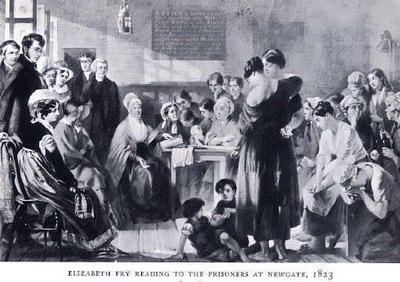ELIZABETH FRY... The Prisoner’s Friend.
 Elizabeth Fry, born at Norwich on May 21, 1780, was the daughter of wealthy banker and merchant, John Gurney. In August, 1800, she became the wife of Joseph Fry, a London merchant.
Elizabeth Fry, born at Norwich on May 21, 1780, was the daughter of wealthy banker and merchant, John Gurney. In August, 1800, she became the wife of Joseph Fry, a London merchant.As early as 1813, Elizabeth began to make several visits to Newgate prison but the great public work of her life dates effectively from the formation of the association for the improvement of the female prisoners in Newgate in April 1817.
Its aims included the separation of the sexes, classification of criminals, female supervision for women and adequate provisions for religious and secular instruction. The accomplishments of this association led to the extension of similar methods in other prisons.
The Association for the Improvement of the Female Prisoners in Newgate not only organised a school for the children, they arranged for a woman to be appointed as matron to supervise the prisoners, and promised to pay her wages. They also provided materials so that the prisoners could sew, knit and make goods for sale, in order to buy food, clothing and fresh straw for bedding.
They took it in turns to visit the prison each day and to read from the Bible, believing that hearing the Bible had the power to reform people. When they applied to the Corporation of London for funding for the school, the Lord Mayor of London came to hear Elizabeth reading the Bible to the prisoners, and he agreed to pay part of the matron's wages.
This was the start of a period of Elizabeth Fry's life when she had extraordinary influence for a woman of her day. In 1818 she was asked to give evidence to a Committee of the House of Common on London prisons, the first woman to do so.
Her experience of Quaker Business Meetings meant she was able to give her evidence clearly and well. She described in detail the lives of the prisoners, and recommended that women, not men, should look after women prisoners, and stressed her belief in the importance of useful employment.
One area where she made important changes was in the treatment of prisoners sentenced to transportation to the colonies. One day in 1818 when she visited the prison she found some of the prisoners were about to riot because the next day they would be taken in 'irons' (hand- and ankle-cuffs and chains), on open wagons, to the ships that would carry them to Australia.
Elizabeth Fry arranged for them to be taken in closed carriages to protect them from the stones and jeers of the crowds, and promised to go with them to the docks. In the five weeks before the ships actually sailed, the ladies of the Association visited daily, and provided each prisoner with a 'useful bag' of things the prisoners would need. They made patchwork quilts on the voyage, which were sold on arrival to provide some income. During the next twenty years she regularly visited the convict ships: in all 106 came under her care.
She visited prisons in Scotland and northern England. Through a visit to Ireland, which she made in 1827, she directed her attention to other detention houses besides prisons. Her visits led to the improvement of the hospital systems and treatment of the insane.
In 1838, Ms. Fry visited France, where she personally met with leading prison officials. In 1839 she received an official permit to visit all the prisons in France in return for a lengthy report. In the summer of 1840, she traveled through Belgium, the Netherlands and Prussia.
In 1843, because of failing health, Ms. Fry was no longer able to travel but she still kept in contact with prison officials to monitor improvements. She died on October 12, 1845, at Ramsgate.
What a wonderful example of Christ in the flesh, that we can emulate!
Loving Father, I ask you in the name of our beloved Lord and Saviour, Jesus Christ, that you would raise up men and woman with ministries like Elizabeth Fry. In Jesus wonderful name I pray! Amen!
GBYAY

<< Home